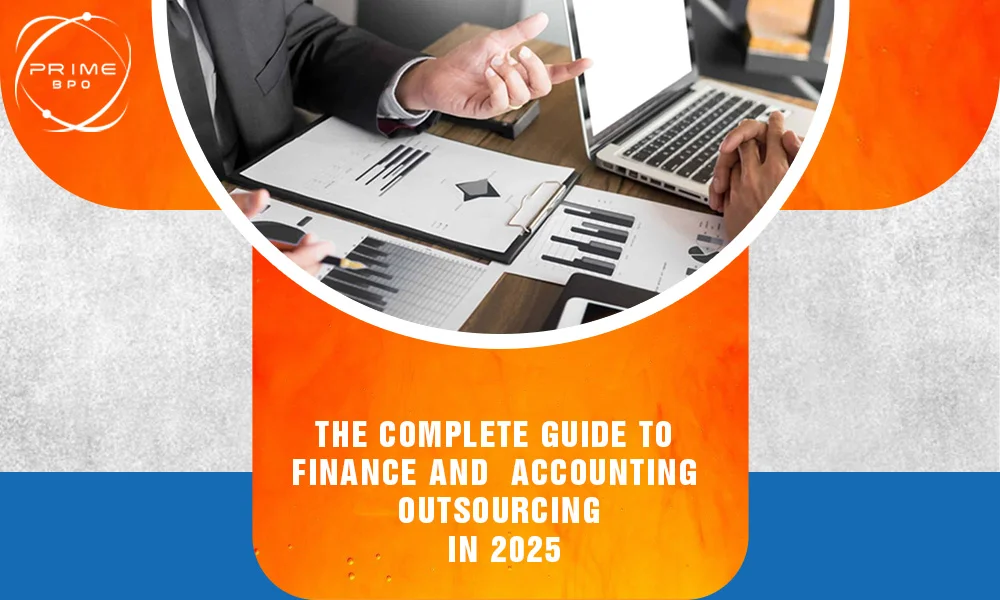Introduction
Finance and accounting outsourcing refers to the practice of delegating financial management tasks—such as bookkeeping, payroll, tax preparation, and reporting—to specialized third-party providers. Businesses choose outsourcing to streamline operations, reduce overhead, and gain access to expert financial talent without the cost of hiring in-house teams.
This approach delivers multiple benefits. First, it improves efficiency by allowing companies to focus on core business activities while professionals handle complex financial processes. Second, it offers significant cost savings through reduced staffing expenses, technology investments, and training costs. Finally, outsourcing provides access to specialized expertise and the latest financial tools, ensuring accuracy, compliance, and strategic insights.
Whether for startups seeking scalable solutions or enterprises aiming to optimize resources, finance and accounting outsourcing is a proven strategy for enhancing operational performance while maintaining financial transparency and control.
What Is the Back Office Role in Finance?
Functions Within the Finance Back Office
The back office role in finance refers to the administrative and support functions that ensure a company’s financial operations run smoothly behind the scenes. Unlike the front office, which interacts directly with clients, the back office focuses on essential internal processes that maintain accuracy, compliance, and efficiency.
Critical Processes and Responsibilities
Key back-office functions in finance include transaction processing, payroll management, data entry, account reconciliation, expense tracking, and financial reporting. Back-office teams also manage regulatory compliance, maintain accounting records, and coordinate with auditors to ensure transparency.
Trends Driving Back Office Transformation
In modern businesses, the finance back office often leverages automation tools and outsourcing solutions to improve accuracy and reduce operational costs. By efficiently handling these critical support tasks, the back office enables the front office to focus on revenue generation, client service, and strategic growth, ensuring the overall financial health of the organization.
What Is the Back Office of Finance Operations?
Role in Supporting Business Functions
The back office of finance operations handles the essential support processes that keep an organization’s financial systems accurate, compliant, and efficient. While the front office focuses on client relationships and revenue generation, the back office ensures these activities are backed by solid financial management.
Integration With Front-Office Activities
Finance operations support front-office functions by processing transactions, reconciling accounts, managing payroll, handling accounts payable and receivable, and preparing financial reports. These tasks provide accurate data and insights that guide business decisions and maintain regulatory compliance.
Typical Workflows in Finance Operations
Typical workflows in back-office finance teams include invoice processing, budget monitoring, expense management, tax preparation, and liaising with auditors. By streamlining these processes, the back office helps reduce errors, control costs, and enable the front office to operate with confidence—ultimately driving overall business success.
Is Financial Reporting Back Office?
Financial Reporting as a Back-Office Function
Yes — financial reporting is typically considered a back-office function because it involves behind-the-scenes processes that support a company’s strategic and operational decisions. Financial reporting provides an accurate picture of a business’s performance through statements such as the balance sheet, income statement, and cash flow report. These documents help stakeholders assess profitability, cash management, and long-term financial stability.
Ensuring Compliance and Accuracy
In most organizations, the back office handles financial reporting to ensure data accuracy, regulatory compliance, and timely delivery of reports. This includes compiling financial data, reconciling accounts, preparing audit-ready documents, and meeting tax or statutory requirements.
Strategic Value of Back-Office Reporting
By keeping financial reporting within the back office, companies benefit from specialized expertise, reduced error risk, and consistent documentation practices. The resulting reports empower executives and front-office teams to make informed, data-driven decisions while ensuring the company remains transparent and compliant with financial regulations.
Best Back Office for Finance Firms
Characteristics of a High-Performing Back Office
The best back office for finance firms is one that delivers accurate, efficient, and compliant support services while enabling the front office to focus on client relationships and revenue growth. A top-tier provider offers end-to-end solutions such as transaction processing, payroll management, account reconciliation, tax preparation, and financial reporting.
Technology, Compliance, and Expertise
Key qualities to look for include advanced technology, such as automation tools and secure cloud platforms, to enhance speed and accuracy. Regulatory compliance is essential, ensuring all processes meet industry standards like GAAP, IFRS, and data security laws. Expertise in financial workflows means the provider can adapt to complex requirements, from investment accounting to corporate finance. Finally, scalability ensures the back office can grow alongside the firm, handling higher transaction volumes or expanding services as needed.
Partnering for Scalability and Profitability
By partnering with the right back-office provider, finance firms can streamline operations, maintain compliance, and improve overall profitability.
Back Office Operations in Banks
How Banking Back Offices Operate
Back office operations in banks refer to the essential support activities that ensure smooth financial transactions, compliance, and accurate record-keeping. While front-office teams handle customer interactions, the banking back office works behind the scenes to process, verify, and settle transactions in line with strict industry regulations.
Key Differences From Other Industries
Banking back-office operations differ from other industries due to the high level of regulatory oversight and the need for real-time transaction accuracy. Daily tasks include payment processing, loan documentation, account reconciliation, fraud monitoring, KYC (Know Your Customer) verification, and regulatory reporting to authorities like central banks or financial watchdogs.
Importance of Regulatory Compliance in Banking
These operations also involve maintaining customer data security, complying with anti-money laundering (AML) laws, and ensuring all records are audit-ready. By efficiently managing these critical processes, the back office enables banks to maintain trust, meet legal obligations, and deliver seamless financial services to their customers.
How Outsourcing Transforms Finance and Accounting Functions
Reducing Costs and Operational Risks
Outsourcing can significantly transform finance and accounting functions by streamlining operations, reducing costs, and minimizing risks. Instead of maintaining large in-house teams, businesses can delegate processes like bookkeeping, payroll, tax preparation, and reporting to specialized providers—cutting overhead expenses and avoiding costly recruitment or training.
Enhancing Compliance and Accuracy
Beyond cost savings, outsourcing reduces operational risks through strict compliance protocols, standardized workflows, and advanced security measures. Partnering with experienced providers ensures accuracy, timely reporting, and adherence to financial regulations.
Access to Advanced Tools and Global Talent
It also offers access to global talent and state-of-the-art financial tools that may be too costly for in-house deployment. From AI-powered analytics to cloud-based accounting platforms, outsourcing equips companies with the latest technologies and expertise.
Driving Strategic Business Advantages
By leveraging these benefits, organizations can shift their focus from routine financial tasks to strategic planning, ultimately driving growth, improving decision-making, and maintaining a competitive edge in the marketplace.
Steps to Successfully Outsource Finance and Accounting
Step 1: Assess Business Needs
Successfully outsourcing finance and accounting begins with a clear understanding of your business requirements. Step 1: Assess your needs by identifying which tasks—such as bookkeeping, payroll, tax filing, or financial reporting—can be delegated without disrupting core operations. Consider budget, timelines, and the level of expertise required.
Step 2: Select the Right Outsourcing Partner
Step 2: Choose the right outsourcing partner by evaluating providers based on industry experience, technology capabilities, compliance standards, and client reviews. Request case studies or references to gauge their reliability and performance.
Step 3: Define Metrics and Communication Standards
Step 3: Set performance metrics and communication protocols to ensure accountability. Define KPIs such as accuracy rate, turnaround time, and compliance adherence. Schedule regular progress reviews and maintain open communication channels for quick issue resolution.
Achieving Value Through Successful Partnerships
Following these steps ensures a smooth transition, minimizes risks, and helps your outsourcing partnership deliver maximum value while freeing up internal resources for strategic business growth.
Common Challenges in Finance and Accounting Outsourcing
Managing Data Security Risks
While finance and accounting outsourcing offers many benefits, businesses must navigate several challenges to ensure success. One major concern is data security—financial records contain sensitive information that must be protected through advanced encryption, secure servers, and strict access controls.
Overcoming Cultural and Time-Zone Gaps
Cultural and time-zone differences can also impact collaboration. Misaligned working hours or varying communication styles may slow down decision-making and create misunderstandings. Choosing an outsourcing partner with flexible schedules and strong cross-cultural communication skills can help mitigate these issues.
Navigating Regulatory Compliance Requirements
Another challenge is regulatory compliance. Finance and accounting processes must adhere to local and international laws, such as tax regulations, GAAP, IFRS, or industry-specific requirements. A knowledgeable outsourcing partner should stay updated on changing regulations to avoid costly errors and penalties.
Solutions to Maximize Outsourcing Success
By addressing these challenges proactively, businesses can enjoy the full benefits of outsourcing while minimizing risks to their financial operations.
Conclusion
The future of finance and accounting outsourcing is being shaped by rapid advancements in technology-driven automation and a shift toward more strategic, value-focused partnerships. Artificial intelligence, machine learning, and robotic process automation (RPA) are streamlining tasks such as data entry, reconciliations, and reporting, allowing providers to deliver faster, more accurate results.
Rather than engaging in purely transactional outsourcing, businesses are forming strategic partnerships with providers who understand their industry, offer proactive insights, and contribute to long-term growth. These partnerships go beyond cost savings—focusing on innovation, compliance, and data-driven decision-making.
As global markets become more competitive, outsourcing will continue to evolve into a collaborative model where technology and expertise work hand-in-hand. Organizations that embrace these trends will not only improve efficiency but also strengthen their competitive edge in the ever-changing financial landscape.
Partner with Prime BPO today and discover how outsourcing can unlock efficiency and growth for your business.
Frequently Asked Questions (FAQs)
1. What are the benefits of outsourcing finance and accounting?
Outsourcing helps businesses cut costs, access expert talent, improve compliance, and free up resources to focus on strategic growth. It also ensures accuracy and efficiency with modern tools and automation.
2. Is financial reporting part of back-office operations?
Yes, financial reporting is a key back-office function. It involves preparing balance sheets, income statements, and cash flow reports to ensure compliance, transparency, and informed decision-making.
3. How does outsourcing reduce costs for finance operations?
Outsourcing reduces costs by eliminating the need for full-time in-house staff, lowering technology and training expenses, and providing scalable services based on your company’s needs.
4. What makes Prime BPO a reliable outsourcing partner?
Prime BPO combines industry expertise, advanced technology, strict compliance, and customized solutions to deliver accurate, secure, and scalable finance and accounting outsourcing.
5. Is outsourcing finance and accounting safe?
Yes — when working with trusted partners like Prime BPO, your data is protected with strict security protocols, encryption, and compliance with international standards such as GDPR and GAAP.
Get Free Quotes
Customized Options Await






